Best Vegan Plant Protein Powders In India (2025 Update)
Are you having difficulty choosing the best plant protein powder in India because you are a vegan? We bring you the best vegan, plant-based protein powder options in India to stop your worries about protein.
Plant-based vegan powders come from many sources, including peas, brown rice, soy, hemp, and seeds. These diverse protein sources offer complete amino acid profiles essential for muscle building and recovery.
First, understand why protein is important. Protein is an essential macronutrient for various body functions. It’s crucial for maintaining healthy skin, hair, and nails, building muscle tissue, and providing essential amino acids for metabolism, growth, and development.
This guide helps you navigate the Indian market’s best plant protein options, evaluating them based on protein content, amino acid profile, digestibility, taste, and value for money.
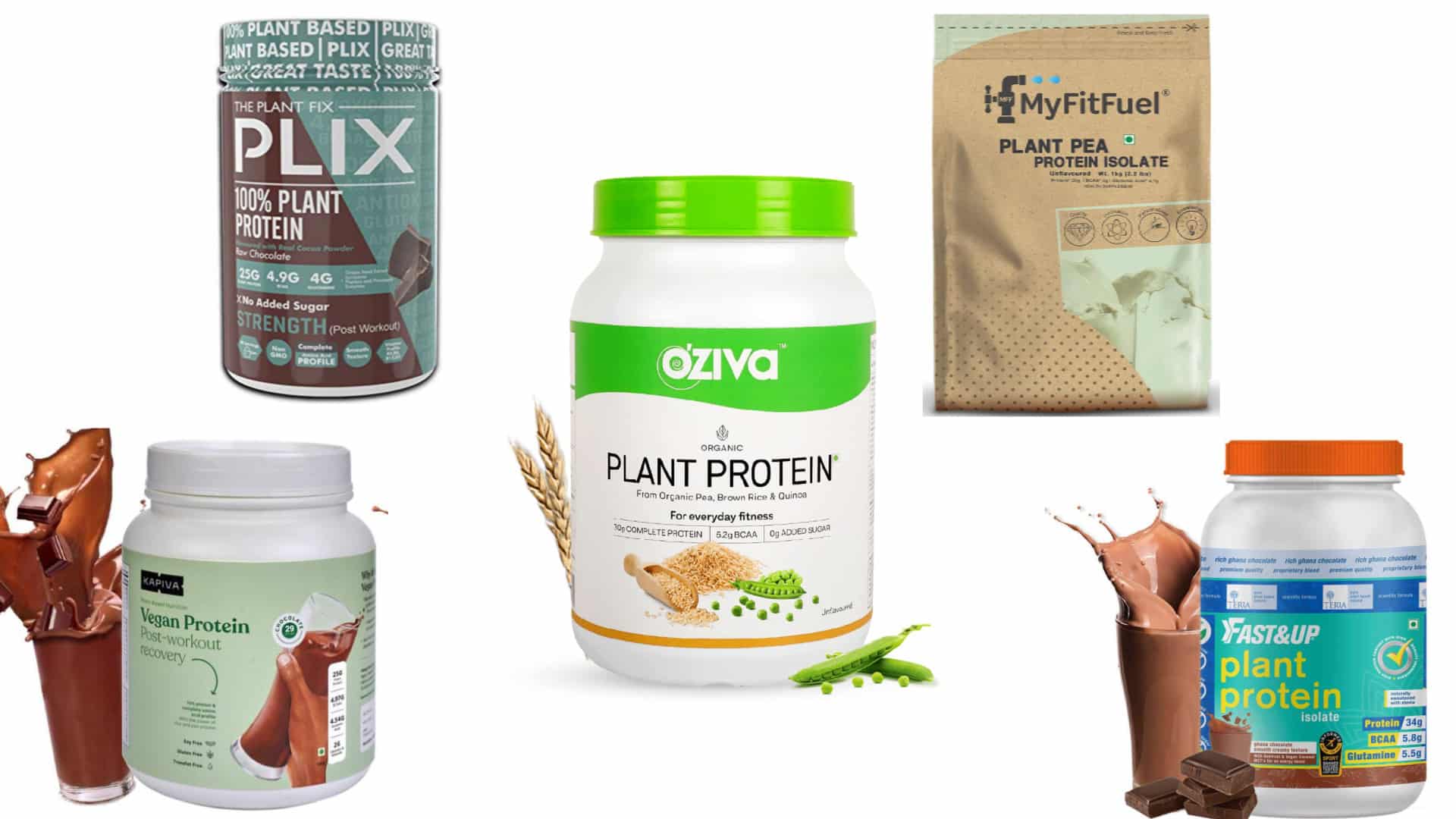
- 10 Best Vegan Plant Protein Powders in India 2025
- 1. OZiva Organic Plant Protein
- 2. Amway Nutrilite All Plant Protein
- 3. MyFitFuel Plant Pea Protein Isolate
- 4. Healthy Hey Organic Protein Plant
- 5. GNC AMP Plant Isolate
- 6. Mypro Sport Nutrition Plant Protein Powder
- 7. Optimum Nutrition (ON) Gold Standard 100% Plant Protein
- 8. Kapiva Vegan Protein
- 9. Muscleblaze bGREEN Vegan Plant Protein Powder
- 10. Fast & Up Plant Protein
- Types of Plant-Based Protein Supplements In India
- How To Choose The Best Vegan Plant Protein Powder
- 1. Amino Acid Profile
- 2. Protein Concentration
- 3. Allergens & Sensitivities
- 4. Clean Ingredient List
- 5. Digestibility & Additives
- 6. Third-Party Testing
- Frequently Asked Questions
10 Best Vegan Plant Protein Powders in India 2025
Choosing the best vegan plant-based protein powder can be difficult and confusing, especially since it’s an important investment in your health. After evaluating over 25 products, we’ve identified these top 10 options based on quality, nutritional profile, and value.
1. OZiva Organic Plant Protein
OZiva Organic is one of the best Plant Protein powders available in India. It’s a premium blend of Organic Pea Protein Isolate, Organic Brown Rice Protein, and Organic Quinoa that provides 30g of Complete Plant Protein per serving with 5.2g of BCAA and zero sugar.
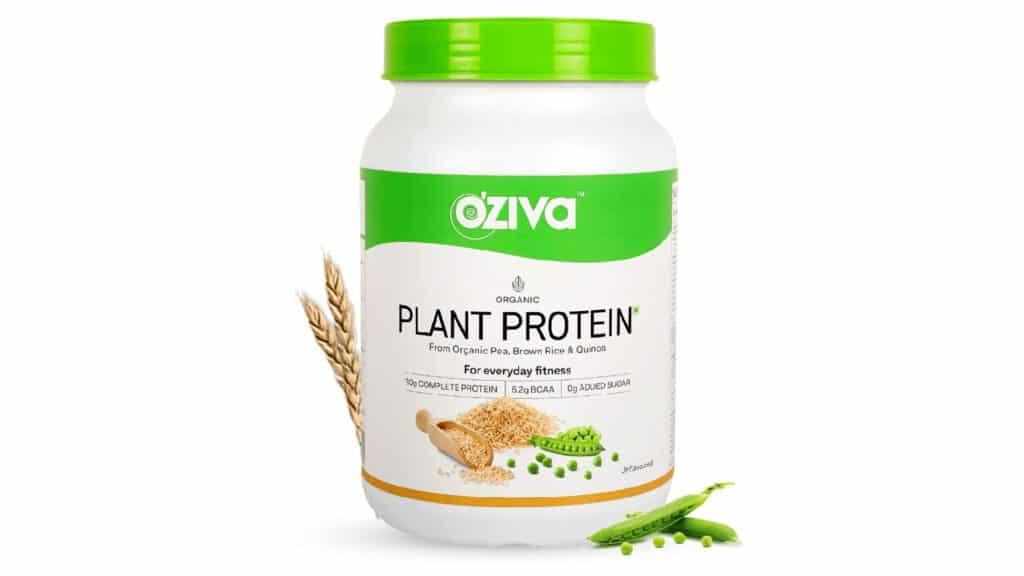
Quick Facts
- Protein sources Pea, Brown Rice, Quinoa
- Protein per serving 30g (83% protein)
- Serving size 36g
- BCAAs per serving 5.2g
- Flavors Unflavored
- Best for Complete BCAA profile and organic quality
- Pros
- Complete BCAA profile for optimal muscle recovery
- Excellent protein concentration per serving (83%)
- 100% organic ingredients with USDA certification
- Free from artificial sweeteners, colors, and flavors
- Enhanced digestibility for better nutrient absorption
- Quinoa adds fiber and additional nutritional benefits
- Cons
- Unflavored version may not appeal to taste-sensitive users
- Premium pricing compared to some alternatives
- May require blending with fruits for better taste
2. Amway Nutrilite All Plant Protein
Nutrilite All Plant Protein Powder provides the goodness of nature through its tri-blend of soy, wheat & yellow pea. With 80% protein per serving that is 100% plant-sourced, it delivers all nine essential amino acids in a well-balanced formula.
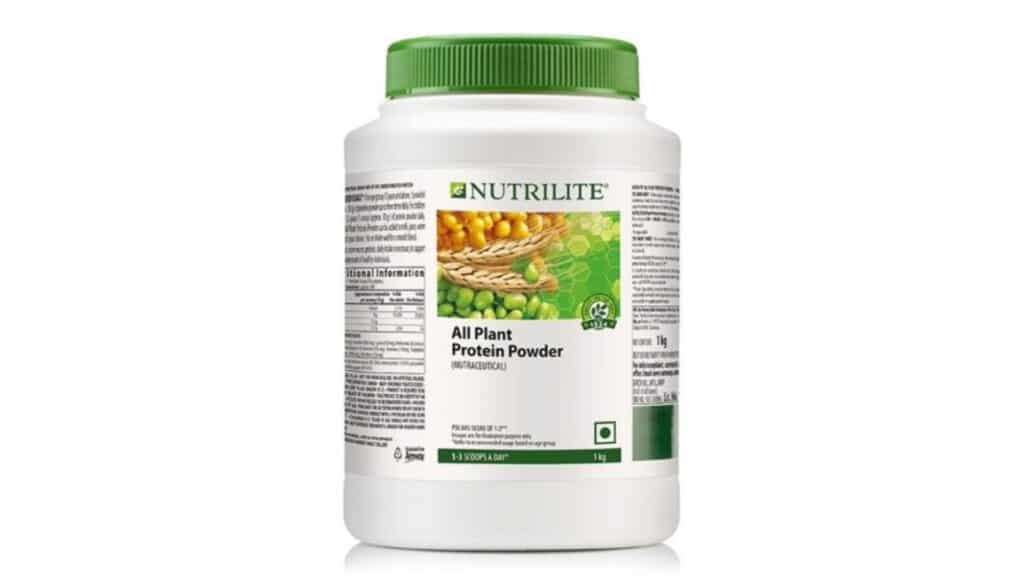
Quick Facts
- Protein sources Soy (82.3%), Wheat (10%), Pea (7.5%)
- Protein per serving 8g (80% protein)
- Serving size 10g
- Special features Contains soy isoflavones
- PDCAAS score 1.0 (highest quality rating)
- Best for Women’s health benefits and high digestibility
- Pros
- Complete range of BCAAs and sufficient glutamine (2.1g)
- High digestibility with PDCAAS score of 1.0
- Benefits female hormonal balance through soy isoflavones
- Suitable for lactose-intolerant individuals
- No artificial additives or fillers
- Global brand with stringent quality control
- Cons
- High soy content may not be suitable for all men
- Not appropriate for those with soy allergies
- Contains wheat (not gluten-free)
- Relatively expensive for the quantity provided
3. MyFitFuel Plant Pea Protein Isolate
MFF Plant Pea Protein Isolate is a pure isolate of plant protein made from peas, providing a high amount of protein per scoop with a complete amino acid profile. This easy-to-digest and mix formula is available in multiple flavors including an unflavored option.
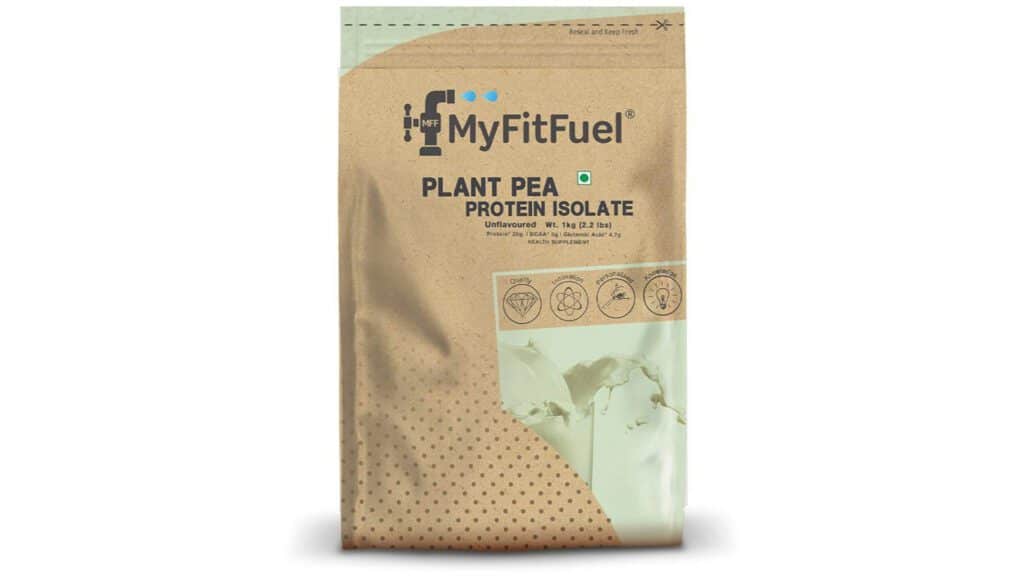
Quick Facts
- Protein source 100% Pea Protein Isolate
- Protein per serving 28g (78% protein)
- Serving size 35.6g
- BCAAs per serving 5g
- Glutamine per serving 4.6g
- Best for Budget-conscious consumers seeking purity
- Pros
- Excellent protein-to-serving ratio (78%)
- Economical compared to mixed protein blends
- High concentration of naturally occurring BCAAs
- Rich source of naturally occurring arginine
- Free from dairy, gluten, soy, and artificial additives
- Multiple flavor options available
- Cons
- Unflavored variant has a distinctive earthy taste
- May cause bloating in some individuals
- Single protein source lacks amino acid diversity
4. Healthy Hey Organic Protein Plant
Healthy Hey Organic Protein Plant is made from a blend of highest-quality yellow split pea and brown rice proteins, making it easy to digest and completely Vegan-friendly. Rich in antioxidants, it helps boost metabolism, promotes satiety, and supports fat loss.
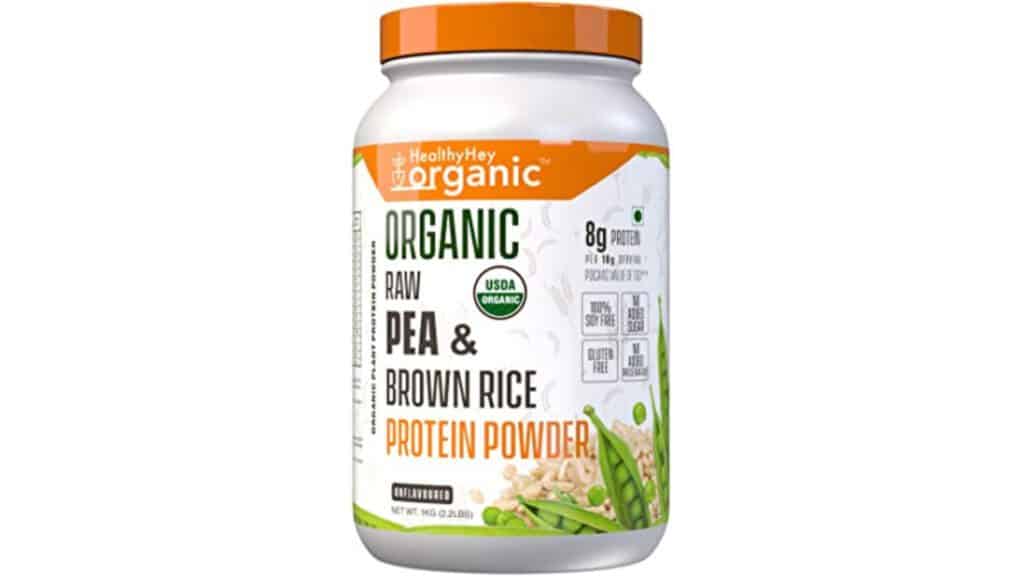
Quick Facts
- Protein sources Organic Pea (60%), Organic Rice (40%)
- Protein per serving 8g (80% protein)
- Serving size 10g
- Certifications USDA Organic, FSSAI, Halal, GMP
- Additional nutrients Potassium, Calcium, Fiber
- Best for Organic certification and metabolic support
- Pros
- Highly bioavailable nutrient profile
- Contains all nine essential amino acids plus BCAAs
- Multiple third-party certifications for quality
- USDA certified non-GMO organic ingredients
- Enriched with antioxidants for recovery
- 60-day money-back guarantee
- Cons
- Unflavored formula has bland taste
- Oversized packaging (container 50% empty)
- Requires additional flavoring for palatability
5. GNC AMP Plant Isolate
GNC AMP Plant Isolate is derived from premium pea protein isolate and brown rice protein extracts. It’s 100% vegan, lactose-free, and soy-free, making it easily digestible and light on your body. Produced via an advanced 8-step purification process for maximum purity.
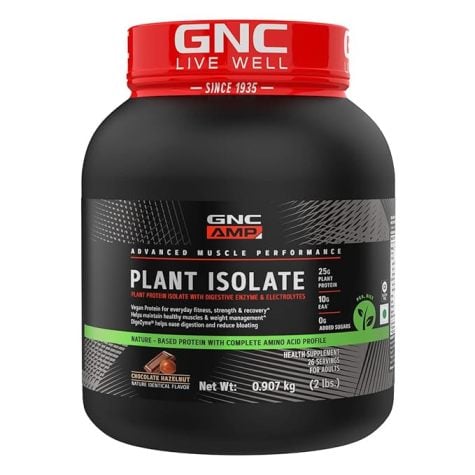
Quick Facts
- Protein sources Pea Protein Isolate, Brown Rice Protein
- Protein per serving 25g
- Serving size 34.5g
- EAA per serving 10g
- Special features Antioxidant & Digestive Enzyme Blend
- Best for Premium quality and digestive comfort
- Pros
- High essential amino acid content (10g per serving)
- DigeZyme digestive enzymes prevent bloating
- Added antioxidants (Grape Seed Extract, Lycopene)
- Sugar-free, gluten-free, lactose-free formulation
- 8-step purification for maximum purity
- Global quality certifications
- Cons
- Some users report chalky texture and poor mixability
- Contains artificial sweetener (Sucralose)
- Premium pricing compared to other options
6. Mypro Sport Nutrition Plant Protein Powder
The MyPro Sports Nutrition Plant Protein Powder is a completely vegan, non-GMO, keto-friendly, low-calorie protein supplement. Three scoops contain 23 grams of protein and 5 grams of BCAA, providing all essential nutrients for optimal body function.
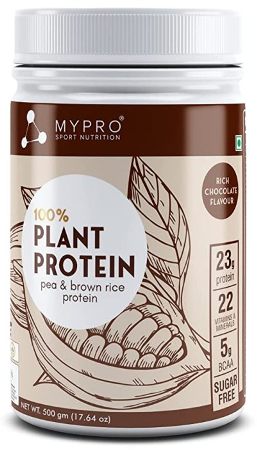
Quick Facts
- Protein sources Pea Protein Isolate, Brown Rice Protein Isolate
- Protein per serving 23.5g
- Serving size 30g
- BCAAs per serving 5g
- Additional ingredients Vitamins, Minerals, Digestive Enzymes
- Best for Post-workout recovery and nutrient support
- Pros
- Zero bloating with easy-to-digest enzymes
- Complete amino acid profile for muscle growth
- Natural digestive enzymes from pineapple and papaya
- Vitamin B12 (1mcg) supports energy metabolism
- Uses natural stevia sweetener (no artificial sweeteners)
- Available in multiple natural flavors
- Cons
- Some flavors may be excessively sweet
- Lower protein content per serving than competitors
- Requires larger serving size for equivalent protein
7. Optimum Nutrition (ON) Gold Standard 100% Plant Protein
Optimum Nutrition (ON) has been trusted by the best athletes worldwide for over 35 years. This high-quality, scientifically formulated blend of plant proteins is available in 90+ countries and dominates Amazon’s bestseller list with its proven formula.
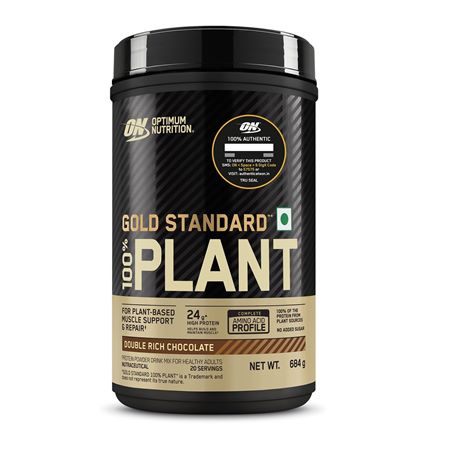
Quick Facts
- Protein sources Pea Protein, Rice Protein (89% of formula)
- Protein per serving 24g
- Serving size 33g
- Arginine per serving 8.8%
- Sweetener Steviol Glycosides
- Best for Brand reputation and global quality standards
- Pros
- Scientifically formulated for optimal amino acid profile
- No artificial colors or flavors
- Zero added sugars (uses natural stevia)
- Non-GMO, dairy-free, gluten-free formulation
- Trusted brand with decades of research backing
- Available in chocolate and vanilla flavors
- Cons
- Moderate bioavailability (67%) in flavored variants
- Premium price point relative to quantity
- Some users report grittier texture than whey
8. Kapiva Vegan Protein
Kapiva Vegan Protein is a healthy powder with a perfect blend of rice and yellow peas, providing high-quality plant protein with complete nutrition. This formula is rich in essential nutrients, vitamins, minerals, and proteins to support overall health.
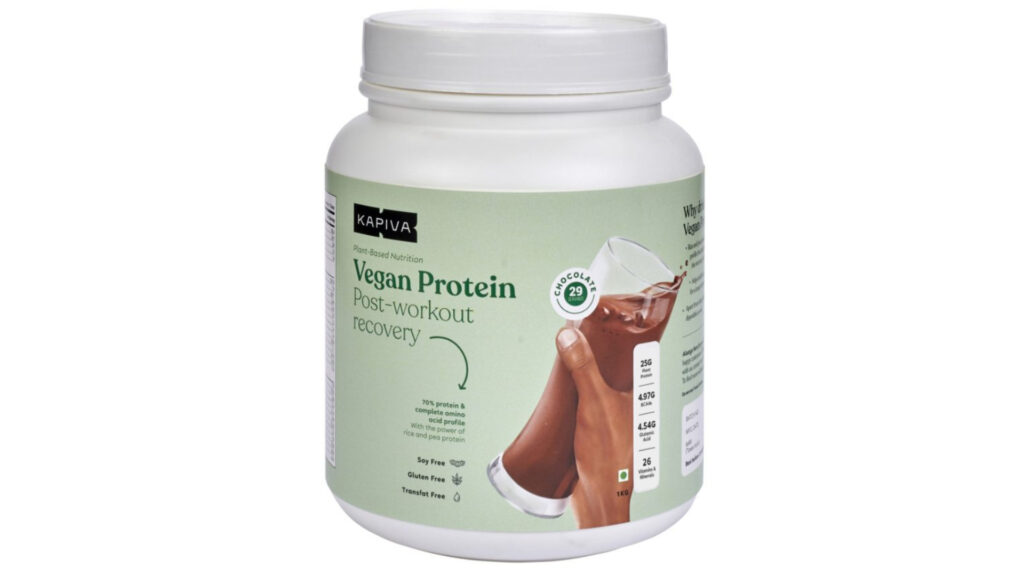
Quick Facts
- Protein sources Rice and Yellow Peas
- Protein per serving 26.4g (75% protein)
- Serving size 35g
- BCAAs per serving 4.97g
- Glutamic acid 4.54g
- Best for Vitamin/mineral fortification and gut health
- Pros
- Balanced blend of rice and pea proteins
- Complete amino acid profile for muscle development
- Contains 26 essential vitamins and minerals
- Includes prebiotic inulin (chicory root) for gut health
- Soy-free, gluten-free, trans fat-free formulation
- Ayurvedic approach to protein supplementation
- Cons
- Some users report mixability issues
- Average bioavailability (75%)
- Added nutrients reduce protein concentration
9. Muscleblaze bGREEN Vegan Plant Protein Powder
This premium plant protein is fortified with an antioxidant blend to prevent muscle cell damage and plant-based enzymes to enhance digestion and absorption of nutrients. This sugar-free, soy-free, dairy-free protein delight is perfect for all vegans!
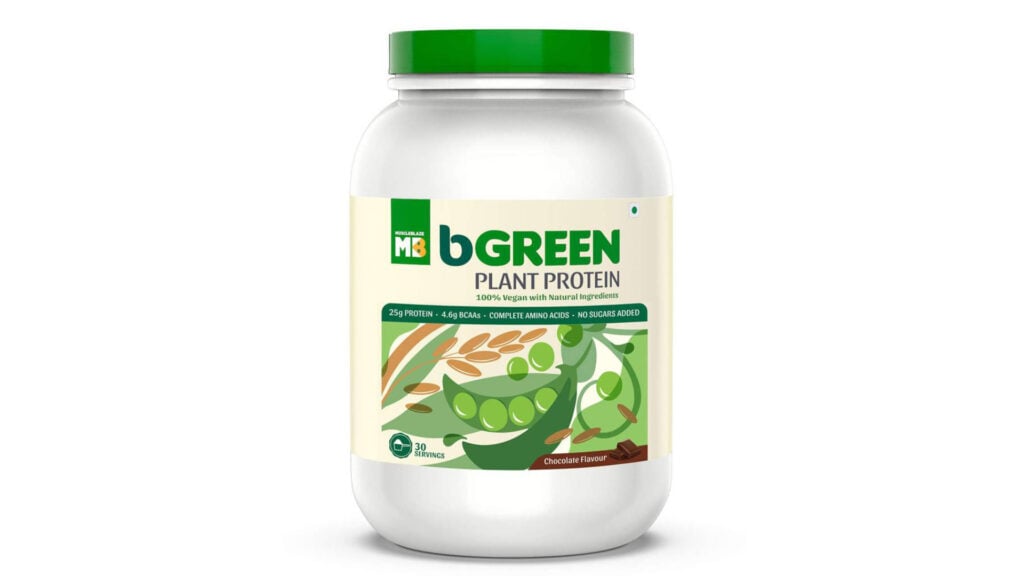
Quick Facts
- Protein sources Pea and Brown Rice
- Protein per serving 25g (74% protein)
- Serving size 34g
- BCAAs per serving 4.6g
- EAAs per serving 9.7g
- Best for Antioxidant support and digestive comfort
- Pros
- Contains plant-based digestive enzymes (papain, bromelain)
- Antioxidant blend with vitamins C, E, and green tea extract
- Complete profile of all 9 essential amino acids
- No added sugar or artificial sweeteners
- Free from dairy and soy allergens
- Domestic Indian brand with good customer support
- Cons
- Some users report digestive discomfort
- Taste may not appeal to all users
- Texture can be grainy in certain beverages
10. Fast & Up Plant Protein
Packed with premium quality plant protein sourced from Yellow Peas and Brown Rice, this formula contains 5.8g of naturally occurring BCAAs and 5.5g of Glutamine. Added Vegan Coconut MCTs boost energy and metabolism to promote fat loss and muscle development.
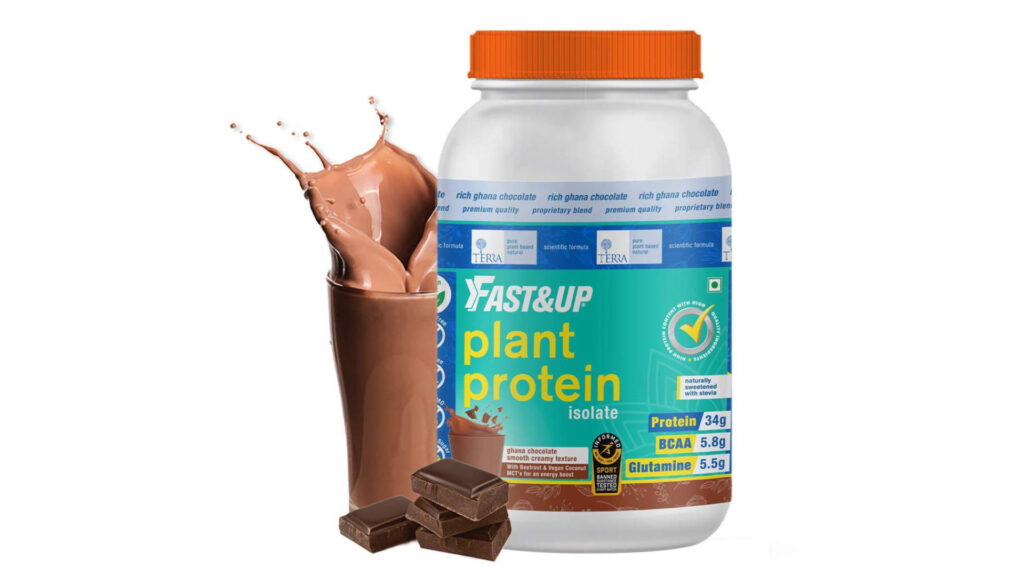
Quick Facts
- Protein sources Pea Protein, Rice Protein
- Protein per serving 30g
- Serving size 45g
- BCAAs per serving 5.8g
- Glutamine per serving 5.5g
- Best for Energy support with MCTs and premium flavor
- Pros
- Complete amino acid profile for muscle development
- High protein content per serving (30g)
- Enhanced with MCTs for energy and fat metabolism
- Premium Ghana chocolate flavor with creamy texture
- Added beetroot extract for energy support
- Informed Sports Certified (tested for banned substances)
- Cons
- Large scoop size means product is consumed quickly
- Higher price point than many competitors
- Larger serving size required for equivalent protein
Know More: Best BCAA Supplements In India
Types of Plant-Based Protein Supplements In India
Plant-based proteins offer diverse nutrient profiles, digestibility, and amino acid compositions. Understanding these differences helps you choose the right supplement for your specific health and fitness goals.
Extracted from yellow split peas, this protein is highly digestible and contains significant amounts of all essential amino acids except methionine.
Key Benefits:
- High in BCAAs for muscle building
- Rich in arginine for blood flow
- Hypoallergenic (no major allergens)
- High satiety factor
Made from sprouted brown rice, this protein is easily digestible but slightly lower in lysine. Often combined with pea protein for a complete amino acid profile.
Key Benefits:
- Excellent digestibility
- Rich in complex carbohydrates
- Contains fiber for gut health
- Hypoallergenic option
One of the few complete plant proteins containing all essential amino acids in proportions similar to animal proteins, with a PDCAAS score near 1.0.
Key Benefits:
- Complete amino acid profile
- Contains isoflavones for women’s health
- May support healthy cholesterol levels
- High digestibility
Extracted from hemp seeds, this protein contains healthy fats including omega-3 and omega-6 fatty acids, plus fiber and minerals.
Key Benefits:
- Contains essential fatty acids
- High in fiber (around 8g per serving)
- Rich in magnesium, iron, and zinc
- Environmentally sustainable source
A complete protein derived from quinoa seeds, containing all nine essential amino acids plus significant nutrients and antioxidants.
Key Benefits:
- Complete amino acid profile
- Rich in minerals (magnesium, iron)
- Contains antioxidants (quercetin, kaempferol)
- Supports digestive health
Made from nutrient-dense pumpkin seeds, this protein is particularly high in zinc, magnesium, and iron, with a pleasant taste.
Key Benefits:
- Exceptionally high in zinc
- Contains healthy fats
- Supports immune function
- Pleasant, mild taste
How To Choose The Best Vegan Plant Protein Powder
With plant protein powders in India ranging from ₹700 to ₹2,500+, making an informed choice is essential. Here are key factors to consider when selecting the right plant protein for your needs:
1. Amino Acid Profile
Look for products with a complete amino acid profile containing all nine essential amino acids (EAAs). Single-source plant proteins often lack certain EAAs, so blended products typically offer better nutritional balance. Pay particular attention to leucine content, which is crucial for muscle protein synthesis.
2. Protein Concentration
Check the protein-per-serving percentage—higher is generally better. Premium plant proteins typically offer 75-85% protein content per serving, meaning a 30g scoop should provide at least 22-25g of protein. Be wary of products that bulk up with fillers and provide less protein per scoop.
3. Allergens & Sensitivities
If you have food allergies, restrictions, or intolerances, carefully check the ingredients list. Common allergens in plant proteins include soy, wheat, and tree nuts. Pea protein and rice protein are generally well-tolerated options for those with multiple sensitivities.
4. Clean Ingredient List
Avoid products with excessive added sugars, artificial sweeteners, flavors, fillers, and preservatives. The shorter and more recognizable the ingredient list, the better. If flavor is important, look for naturally flavored options using cocoa, vanilla extract, or stevia.
5. Digestibility & Additives
Some plant proteins can cause digestive discomfort. Look for products with added digestive enzymes (like bromelain, papain, or DigeZyme) or formulations specifically designed for easy digestion. Micronized or hydrolyzed proteins typically offer better digestibility.
6. Third-Party Testing
Prioritize products that have undergone third-party testing for purity and potency. Certifications like FSSAI approval, USDA Organic, Non-GMO Project, or NSF Certified for Sport indicate higher quality standards and reduced risk of contaminants.
Key Considerations for Special Diets
- For muscle building: Higher BCAA content (especially leucine)
- For weight loss: Lower calorie, higher protein percentage
- For sensitive digestion: Added enzymes, no artificial sweeteners
- For complete nutrition: Added vitamins, minerals, fiber
- For keto diet: Low carb, higher fat content (MCTs)
- For athletes: Banned substance tested certification
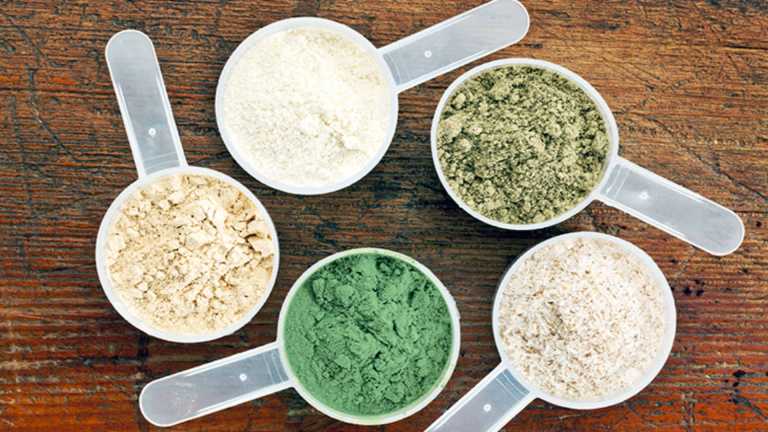
Frequently Asked Questions
How to Use Plant-Based Protein Powders Effectively?
Plant-based protein powders can be incorporated into your diet in several ways:
- In smoothies and shakes: Blend with fruits, vegetables, plant milk, and optional add-ins like nut butter or seeds for a complete meal replacement.
- In baking: Replace 15-25% of flour in pancakes, muffins, and bread recipes for protein-enriched baked goods (adjust liquid accordingly as plant proteins absorb more moisture).
- In oatmeal or porridge: Stir into hot cereals after cooking for a protein boost without affecting texture.
- In energy balls: Combine with dates, nuts, and other binding ingredients for no-bake protein snacks.
- Post-workout recovery: Mix with water or plant milk within 30-45 minutes after exercise for optimal muscle recovery.
For best texture and taste, blend unflavored varieties with strongly flavored ingredients or choose naturally flavored options. Plant proteins generally mix better in blenders than with shakers.
How much protein do you need every day?
Protein requirements vary based on activity level, goals, and individual factors:
- General population (sedentary): 0.8g per kg of body weight daily (ICMR recommendation)
- Active individuals: 1.0-1.2g per kg of body weight
- Strength athletes/muscle building: 1.2-1.7g per kg of body weight
- Endurance athletes: 1.2-1.4g per kg of body weight
- Weight loss/cutting phase: 1.6-2.2g per kg of body weight to preserve muscle mass
- Vegetarians/vegans: May benefit from the higher end of the ranges due to lower digestibility of plant proteins
For example, a 70kg active person would need approximately 70-84g of protein daily, while the same person focusing on building muscle would aim for 84-119g daily. Spreading protein intake throughout the day (20-30g per meal) is more effective than consuming it all at once.
Is OZiva protein vegan?
Yes, OZiva Organic Plant Protein is 100% vegan. It’s a premium blend of organic pea protein isolate, organic brown rice protein, and organic quinoa. All ingredients are plant-derived with no animal products or byproducts.
OZiva also ensures their manufacturing processes maintain vegan integrity by preventing cross-contamination with animal-derived ingredients. Their formula is free from dairy, eggs, honey, and all other animal-derived ingredients, making it suitable for strict vegans.
Additionally, OZiva’s plant protein is certified organic, ensuring the plant sources are grown without animal-derived fertilizers or processing aids.
Is plant-based protein powder healthy?
Yes, plant-based protein powders offer numerous health benefits:
- Easier digestion: Plant proteins are generally more digestible than animal proteins for many people, causing less gastrointestinal distress.
- Higher nutrient density: Plant proteins naturally contain more fiber, antioxidants, vitamins, and minerals than animal-based proteins.
- Heart health benefits: Plant proteins are naturally cholesterol-free and may help improve lipid profiles and reduce inflammation.
- Lower allergenicity: Many people who react to whey or casein can tolerate plant proteins (though soy and wheat can still be allergens).
- Environmental sustainability: Plant proteins require significantly fewer resources to produce than animal proteins.
- Alkaline-forming: Unlike many animal proteins which can be acid-forming, plant proteins help maintain healthy pH balance in the body.
Research shows plant proteins can be equally effective for muscle building and recovery when consumed in appropriate amounts and with attention to complete amino acid profiles.
Can plant protein build muscle as effectively as whey?
Yes, plant proteins can build muscle effectively when used correctly. While individual plant proteins may have lower leucine content (the key amino acid for muscle protein synthesis) than whey, this can be addressed by:
- Consuming slightly larger quantities of plant protein (25-30g vs. 20-25g for whey)
- Using blended plant proteins that complement each other’s amino acid profiles
- Choosing leucine-enriched plant protein formulations
- Ensuring adequate total daily protein intake
Multiple studies have shown comparable muscle and strength gains between plant and animal protein groups when protein quantity is equated. The additional phytonutrients in plant proteins may even offer advantages for recovery and long-term health.
How do I mix plant protein for the best taste and texture?
Plant proteins can sometimes have grittier textures or stronger flavors than whey. Here are tips for optimal mixing:
- Use a blender rather than a shaker bottle for smoother results
- Add plant milk (almond, oat, soy) instead of water for creamier texture
- Incorporate healthy fats like avocado, nut butters, or coconut milk to improve mouthfeel
- Add frozen banana to mask earthy flavors and create creamier consistency
- Try flavor enhancers like cinnamon, vanilla extract, cocoa powder, or a dash of salt
- Mix with stronger flavors like berries, coffee, or chocolate to complement earthy notes
- Let sit for 5-10 minutes after mixing to allow protein to fully hydrate
Some brands (like MyPro and MuscleBlaze) offer better mixability than others, so experiment with different products if texture is important to you.
Are there any side effects of plant protein powders?
While plant proteins are generally well-tolerated, some potential side effects include:
- Digestive discomfort: Some people experience bloating, gas, or stomach upset, especially with higher-fiber options like hemp protein
- Allergic reactions: Particularly with soy or wheat-based proteins
- Sweetener sensitivity: Some may react to stevia or other natural sweeteners
- Heavy metal concerns: Lower-quality plant proteins may contain trace heavy metals (choose reputable brands with third-party testing)
To minimize side effects, start with smaller doses, choose products with added digestive enzymes, stay well-hydrated, and select third-party tested products. Most side effects diminish as your body adjusts to the new protein source.
Disclaimer: It’s important to consult with a doctor or dietitian before using any protein powder as a supplement, especially if you have any health conditions or are taking any medications.

Manish is a NASM-certified fitness and nutrition coach with over 10 years of experience in weight lifting and fat loss fitness coaching. He specializes in gym-based training and has a lot of knowledge about exercise, lifting technique, biomechanics, and more.
Through “Fit Life Regime,” he generously shares the insights he’s gained over a decade in the field. His goal is to equip others with the knowledge to start their own fitness journey.
